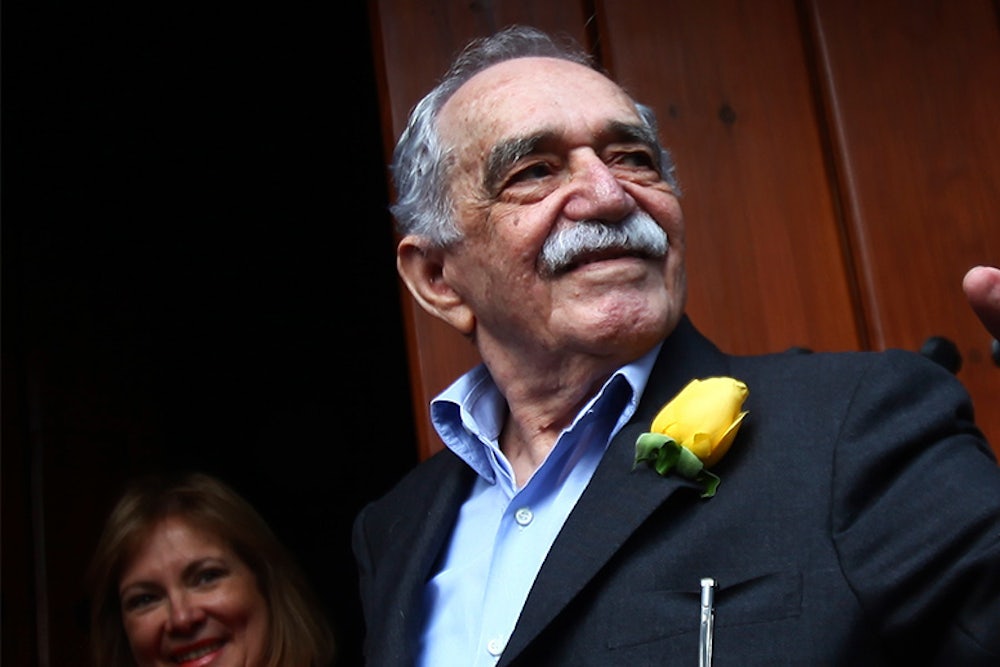There are only two books that matter in the Spanish language, Don Quixote of La Mancha and One Hundred Years of Solitude. All the rest are mere footnotes. Their themes are one and the same: the capacity to see life not for what it is but for what it should be.
Such was my astonishment after finishing One Hundred Years of Solitude for the first time that I remember wondering if it wouldn’t be better for its author, Gabriel García Márquez, to simply fall silent, to stop writing once and for all. What else could he produce that would even come close to it? Of course, he wrote almost twenty other books, from Chronicle of a Death Foretold, a detective novel turned upside down (everyone knows who the victim is from the beginning except the victim himself), to the endearing and memorable Love in the Time of Cholera. Plus, he wrote a first-rate autobiography, Living to Tell the Tale, that, in its concentration, puts most memoirs to shame.
Yet all these achievements pale in comparison to his magnum opus. That’s because the saga of the Buendía family contains, in its dense, baroque pages, the DNA of Latin America: its colonial mentality, its fervent desire for freedom, its complex domestic life. Indeed, there is something in One Hundred Years of Solitude that makes it feel eternal, as if it had been written millennia ago. If Gabriel García Márquez had written nothing else in his life, he would still be the most important Spanish-language writer ever—more important even than Cervantes.
For Don Quixote is a rather messy book: built on anecdotes, it runs for too long. Character development soon gives way to repetition, and careless mistakes are abundant. In contrast, the story of García Márquez’s Macondo, the fictional coastal town in Colombia that resembles the real world town of Aracataca, where García Márquez was born in 1927, is enviably conceived—and conceived at a time, by the way, when word processors didn’t yet exist. From accounts of its inception, it seems as if very little editing took place before its publication in 1967.
That’s why, to me, it seems as if García Márquez isn’t its author but an amanuensis who simply transcribed what the muses dictated to him. Legend goes that he was driving a Volkswagen with his wife Mercedes and his children, on their way to vacation in Acapulco, when the first line of the novel showed up to him. He said he needed to turn back and return to their home in Mexico City. He isolated himself for 18 months in his studio until the last dot was in place. On occasion he would come out to get a bit of fresh air. Or else, to cry at Mercedes’ side after a character like Colonel Aureliano Buendía, the novel’s center of gravity, finally dies.
One Hundred Years of Solitude doesn’t really span a hundred years. If Don Quixote is considered the first modern novel, maybe this one is the last. It offers a refreshingly new way of seeing time, which is really the central theme every major writer tackles. It makes fun of itself, its characters, and the reader, while also being one of the most serious books ever conceived. More than anything else, it is a telenovela, melodramatic to the core. That syrupy quality may be the reason why it is perceived, paraphrasing Hamlet, as a work that holds a mirror up to nature. Hispanic civilization wears its emotions on its sleeve: It is irascible, temperamental, and unpredictable. It is also simultaneously hopefully and fatalistic.
I once wrote a biography of García Márquez’s first 40 years, up until 1970. As I was about to write a volume about the next forty years, I realized I didn’t much care about that period. He was an idealist who identified with change in his youth. The Cuban Revolution of 1958-9 inspired him, and his generation of intellectuals. But then his politics became stagnant. He was a close, and to a large extent uncritical, friend of Fidel Castro, and even had a house in Havana. Whereas Octavio Paz, Carlos Fuentes, and Mario Vargas Llosa, among others, distanced themselves from revolution, in ideological terms, García Márquez didn’t move much. He also had a home in Mexico and another in Colombia. (He had the exact same furniture and technology in all of them, to allow him the comfort he needed to write.) As savvy as he was in literary terms, in his politics he was a dinosaur.
For what we know, Cervantes, too, might have been a reactionary, never fully denouncing the inquisitorial improprieties of his time. Still, it is literature that survives, not politics. And One Hundred Years of Solitude might be said to have augured an era of openness in Latin America. Expectedly, the crop of writers who came after García Márquez resented his fame. Indeed, Macondismo is a common term used in the Spanish-speaking world to describe the tendency to portray reality as fashionably primitive. The anti-Macondistas gave place to an antidote, McOndo, a literary movement that stressed the Americanized quality of the Hispanic world.
All this is proof that the Buendías are forever.
